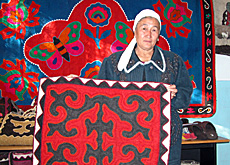
Switzerland has mixed record in Central Asia

Switzerland has been providing development aid to Central Asia for more than ten years, but its largesse is not entirely selfless.
Swiss projects have chalked up some notable successes, but there have also been some white elephants.
“What does Switzerland want in return?” is a common question in parts of Kyrgyzstan and Uzbekistan which are benefiting from Swiss development aid.
Switzerland has its own reasons for helping Central Asian countries to develop; chief among them is the awareness that social, demographic and environmental problems do not stop at national borders.
But in Central Asia’s case, Switzerland’s motives really do end there. “Switzerland development policies have a very good reputation,” Wolf Linder, a political scientist of the University of Bern, told swissinfo.
“Our policies are sustainable, involve the local population and we do not intend to benefit politically or economically.”
Fighting poverty
For the Swiss Agency for Development and Cooperation (SDC), the main aim “is to fight poverty”, Derek Müller, head of the SDC’s Central Asian programmes, told swissinfo.
The SDC has been active in Central Asia since 1991, working to assist in the transition to the free market economy.
The Swiss State Secretariat for Economic Affairs (Seco) has a similar goal. “With our Private Public Partnership (PPP) programme we are trying to cooperate with the private sector,” said Christian Hofer of the development and transition section at Seco.
In 2002 the SDC and Seco invested more than SFr50 million ($40 million) in Central Asia and similar amounts are due to be spent every year until 2006.
Switzerland funds various projects, including good governance, conflict prevention, economic development, the creation of efficient health care systems, and the protection of natural resources.
Tolerance
The SDC also finances local projects to boost tourism and culture, largely with the aim of improving understanding and tolerance of the region’s different ethnic groups.
Seco tends to focus on economic projects, such as infrastructure development. For example, together with the World Bank and the European Bank for Reconstruction and Development (EBRD) it has financed sewage water systems in the cities of Bukara and Samarkand.
“It is quite difficult to take stock but the situation in Kyrgyzstan and Uzbekistan has certainly improved in the past ten years,” said Seco’s Christian Hofer.
What is clear, according to Wilhelm Meyer, the Swiss ambassador in Tashkent in Uzbekistan, is that “we are a main player in the region”.
“We are dealing with serious problems and that is why the cooperation between Seco and the SDC is important – even though we have made mistakes in the past.”
These “mistakes” include projects which were started but not finished, and others that will continue only as long as Switzerland stumps up the cash.
Hard cheese
A cheese producing plant in the east of Kyrgyzstan, for instance, turned out to be flop. But Meyer says that even a failed project does yield something.
“Even if a project fails it can still be used to teach the population. In the case of the cheese producing plant we were able to teach the people about hygiene,” Meyer argued.
More broadly, Switzerland comes in for criticism from non-governmental organisations for stinginess.
“Forty-six per cent of Switzerland’s income comes from abroad,” says Christiane Heberlein of the Berne Declaration. “However, not even 0.4 per cent of gross domestic product (GDP) is spent on aid for the poorest countries.”
Efficiency and effectiveness
But Catherine Schümperli, professor of development research at Geneva University, told swissinfo that before Switzerland pumps more money into the region, it must improve the efficiency and effectiveness of existing projects.
One area which needs improvement is the cooperation between the Swiss government’s own agencies – the SDC and Seco, according to the Organisation for Economic Cooperation and Development (OECD).
Schümperli says Switzerland’s development policy must be made more compatible with economic policy. She cites an export risk guarantee given to the Swiss-Swedish group, ABB, as part of its involvement in China’s Three Gorges Dam.
“Switzerland gave ABB the guarantee [even though] the project did not respect the humanitarian or the ecological objectives of Switzerland’s development policy. There was a clear contradiction.”
Schümperli believes that while awareness of such a contradiction has been raised, more needs to be done.
swissinfo, Marzio Pescia (translation: Billi Bierling)
SFr50 million a year is invested in Central Asia by the Swiss development agency and the State Secretariat for Economic Affairs.
Switzerland’s total development aid spending is worth SFr1.5 billion, or 0.35% of GDP.
The government aims to increase aid spending to 0.4% of GDP by 2010.
The United Nations wants countries to increase their aid budgets to 0.7% of GDP.

In compliance with the JTI standards
More: SWI swissinfo.ch certified by the Journalism Trust Initiative
















![The four-metre-long painting "Sonntag der Bergbauern" [Sunday of the Mountain Farmers, 1923-24/26] had to be removed by a crane from the German Chancellery in Berlin for the exhibition in Bern.](https://www.swissinfo.ch/content/wp-content/uploads/sites/13/2025/12/01_Pressebild_KirchnerxKirchner.jpg?ver=917ecbf2)














You can find an overview of ongoing debates with our journalists here . Please join us!
If you want to start a conversation about a topic raised in this article or want to report factual errors, email us at english@swissinfo.ch.